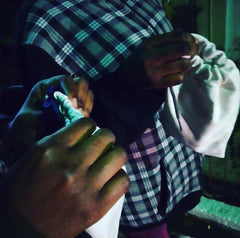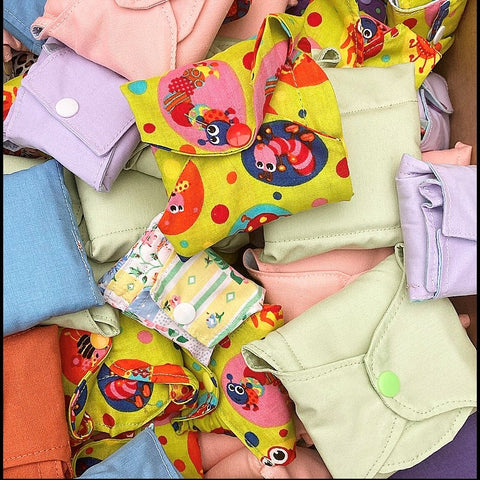Written by Ella Lambert, CEO and Founder of The Pachamama Project, a not-for-profit growing a network of volunteers in the UK to make reusable sanitary pads for refugees.
Back in March as we were struck with fears about the future and as we watched Italian news clips of elderly couples dancing from their balconies, a huge sense of community sprung from our worries. We clapped for the NHS, we dropped food parcels on the doorsteps of our isolating neighbours, and we created stupid quizzes for our nightly zooms with friends we hadn’t seen since school. But as we understandably complained about the cancelled trips and festivals, missed our friends and families and sulked about sitting in our homes, there were, and are, refugees who don’t even have a place to call home.
I was meant to be travelling to Latin America last summer to work in a refugee camp and, as we were shut down, panicking about how long this would last and worrying if our families would be ok, it dawned on me that the displaced people who I was hoping to help must be suffering so much more under the added strain of this pandemic. As well as the obvious pressures of being locked down, often in a tent, without freedom to even go to the supermarket, the usual support and aid from NGOs took a massive hit as organisations endeavoured to keep their volunteers safe and governments were forced to limit their activities. As they should, food and shelter became a priority for these organisations, but distributions of much-needed sanitary products took a back seat. It left me thinking that if these refugees had a product that would last longer than a stop at a shelter or a distribution at a camp, they would have one less thing to worry about. Periods are already the worst, and without the privilege of being able to climb into bed with a hot water bottle when the cramps kick in, it breaks my heart that so many women are also having to worry every month about whether they will get the products they need to get on with their daily activity.

I borrowed a sewing machine and enlisted my friend Oliwia and we got to work collecting material from the local community, developing a pattern from various YouTube tutorials, and learning to sew! We quickly realised how easy it was to make them and that people all around the country, many with extra time on their hands thanks to the lockdowns, could be doing this too. So, my brother launched a fundraiser for us, hoping to raise £500 to cover our initial costs by running 50Km in 5 days. The distance represents the route between Aleppo in Syria and the Turkish border, a journey so many refugees have had to take to get to safety. Luke, along with several of his friends, Jenny Barruol and the University of Bristol netball society, took on the challenge and have raised an amazing £2,300 to date. We are continuing to encourage sports groups and individuals to take on the challenge and raise a bit of money for the organisation.
We then reached out to university societies, craft clubs, churches, mosques and community clubs, Duke of Edinburgh students, guides groups, schools, nursing homes, you name it, and encouraged people to get involved and help us reach as many refugee women as possible. We have been overwhelmed with the uptake and, in just four months, have recruited 154 volunteers and counting and have collectively made 2,439 pacha pads, enough to take 609 women out of period poverty.

We are now partnered with four charities in two countries: Greece and Lebanon. In Greece, we are working with The Azadi Project to distribute our Pacha Pads to refugee women in housing with access to washing facilities as well as providing menstrual hygiene sensitisation, disposable pads and adult nappies to women in the Moria 2.0 refugee camp who don’t. We have also been lucky enough to partner with EuroRelief who work tirelessly within the camp to provide medical care, shelter as well as our sanitary pads and nappies. The women in Moria 2.0 are at constant risk of gender-based violence and often resort to using nappies at night as they are too afraid to leave their tents.
In Lebanon, we are working with The Free Shop Lebanon in the Bekaa Valley, where refugees have the freedom to choose what donations they need and have the support of a nurse to provide essential menstrual hygiene education with the Pacha Pads. We are also working in Beirut with Wing Woman Lebanon to distribute pacha pads to Lebanese women affected by the explosion and to provide materials and training to a group of refugee women who will be making their own Pacha Pads and selling them to generate some extra income.
This truly is a community effort and every friend, friend of a friend and family member has pitched in and given up their time to support us. I reached out on my university Facebook group to see if anyone would be able to design our website and the wonderful Elizabeth Walsh came into our lives; the mum of a Bristol student, who has not only designed the website for free but donated the domain name and hosting in perpetuity. If you need something done, get a busy woman to do it!

Smoothie London have supported us from day dot, donating 10% of their profits, collaborating with Charlotte Karin to make and sell masks to generate more profits for us, creating Instagram assets and getting the word out about the project.
At every step along the way we have been met with immense support, particularly from women who have taken this cause personally and understand deeply the taboos and stress that surround periods even in the most privileged environments. From schoolgirls who have set up Pacha clubs in their colleges, the female run Salvaged Project who donated all of their December profits, Rosi from RosiSkinfood supporting us with 10% of her profits, my mum and grandma who have become the most productive Pachamamas and Georgia and Riya at Smoothie London who have championed our work from the get-go. Thank you to everyone, who, despite facing the hardest year in our memory, has given up their time for another. Cheers to a better year ahead!
To get involved please contact thepachamamaproject@outlook.com and learn more via www.thepachamamaproject.org and our social media @thepachaproject (Instagram/Twitter/Facebook).



